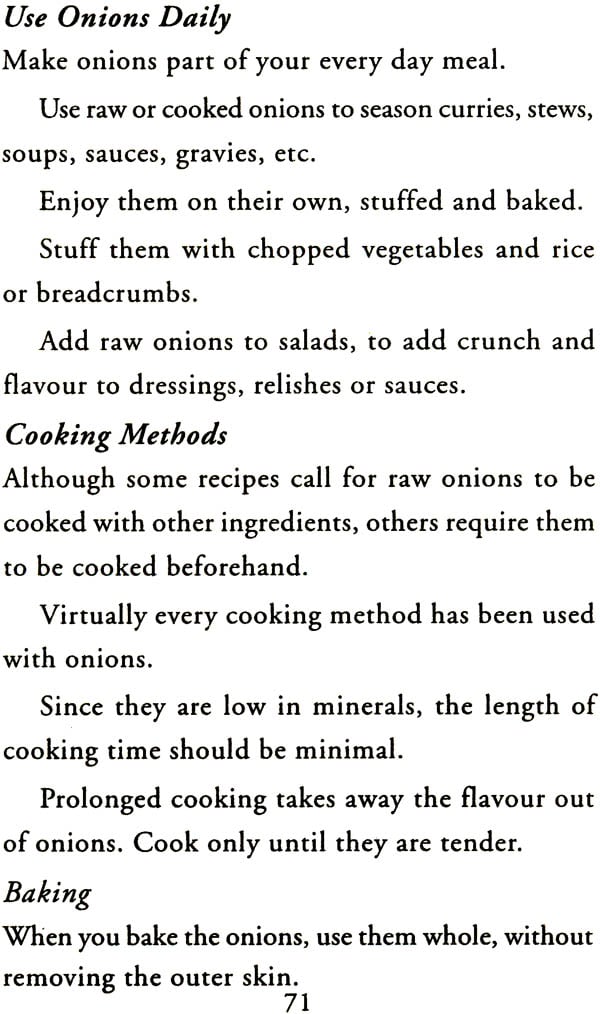
The Secret Benefits of Onion and Garlic
Book Specification
| Item Code: | IDG385 |
| Author: | Vijaya Kumar |
| Publisher: | New Dawn Press |
| Edition: | 2006 |
| ISBN: | 1845575334 |
| Pages: | 136 |
| Cover: | Paperback |
| Other Details | 8.5" X 5.5" |
| Weight | 180 gm |
Book Description
Back of Book:
Tears and bad breath - these are the two things usually associated with onion and garlic. But there is much more to these two popular vegetable, which are known not only for their unique flavours but also for their therapeutic benefits. Onion and garlic are guaranteed to transform any meal into a profoundly aromatic culinary experience.
This book explores the hidden benefits of onion and garlic. It discusses at length the composition of these vegetables, their culinary as well as medicinal uses and tips for proper storage. So forget about tears and bad breath. Appease your tastebuds with the pungent smell and flavour of onion and garlic and also discover their curative powers.
Introduction:
An onion can make people cry, but there's no vegetable that can make them laugh!
-Anonymous
The onion family can bring tears to your eyes, literally. Despite the tears, onions, and garlic are popular vegetables or condiments, and favoured by the home grower and cooks, Indeed, what would a kitchen be without the distinctively pungent smell and taste of onions and garlic filling out the flavours of almost every type of cuisine imaginable!
The word 'onion' comes from the Latin word unio meaning 'single' or 'one', because the onion plant produces a single bulb, unlike its cousin, the garlic, that produces many small bulbs. The name also describes the many separate, concentrically arranged layers of the onion.
Garlic is a native Germanic word, being composed of two elements: gar meaning 'spear', referring to the pointed leaves, and lie, meaning either leek or onion. Being efficient preservatives, leek and its relatives were considered powerful magic plants by Germans.
In classical Latin, garlic was termed allium, which is still the botanical genus name for garlic, onion leek, shallor, chives, etc. Derived from a Celtic root, they all mean 'burning, pungent'.
Onions and their relative are botanically known as alliums, a plant genus that has been classified at different times as belonging to the lily family, the amaryllis family, or Alliaceae family. There are more than 500 alliums. All of the edible species are bubbling plants with a characteristic pungent smell or taste, which is produced once their layers of skin are cut.
Garlic (Allium Sativam) has lovingly been dubbed 'The Stinking Rose'. If you go back to the Anglo-Saxon roots of the word 'garlic', you come up with 'gar-leac'. Leac was the term for any plant of the allium genus. Onions were 'ynne-leac', and leeks 'pot-leac'. Gar meant 'spear' and referred to the spearhead shape of the cloves. 'Clove' comes from the Old English chifu, from which the modern word 'cleave' derives. When you cleave the garlic head you get cloves.
Onion and garlic are a borderline case between spices and vegetables. They are indispensable ingredients to nearly every cuisine of the world, and used for large spectrum of different dishes. Today, they rank sixth among the world's leading vegetable crops. In the United States, Gilroy (California) promotes itself as the 'Garlic Capital of the World'.
Onion and garlic have been in use by man for centuries. He has found quite a number of uses of them for many of his ailments. Ayurveda, Unani and folklore medicines offer a host of diverse uses and efficiencies. Modern day investigations corroborate their benefits and uses in medicine. Classical authors like Charaka, Sushruta, Harita, etc., extensively mention the use of onion, in their works. The Chinese, the Egyptians, the Hebrew, the Greeks and the Romans have all used garlic as an item of diet or medicine. Hippocrates, the Father of Modern Medicine, was convinced that it cured all sorts of digestive disorders, while Homer, the great Greek epic poet, raved about its divine properties. Aristophanes, a famous Greek dramatist, mentioned in a passage that garlic offered great strength to the Greek soldiers during was. Pliny, the Roman historian, extolled the use of garlic.
In bygone days, onions and garlic were believed to have the best curative powers. Today, they are recognised all over the world as all-round wonder drugs for he treatment of several diseases. In fact, during the American Civil War, General Ulysses S. Grant sent a telegram to the War Department, "I will not move my army without onions!" The next day he got them!.
Onions and garlic are known to serve as anticoagulants, anti-depressants, pain-killers, mucus removers, insulin stimulators, antibiotics, and anti inflammators.
| Introduction | 7 | |
| 1. | Origin and History | 11 |
| 2. | Description and Propagation | 25 |
| 3. | Varieties of Onions and Garlic | 30 |
| 4. | Composition | 51 |
| 5. | Selection and Storage | 60 |
| 6. | Benefits in Cuisines | 68 |
| 7. | Health Benefits | 81 |
| 8. | Other Uses and Quick Facts | 125 |






